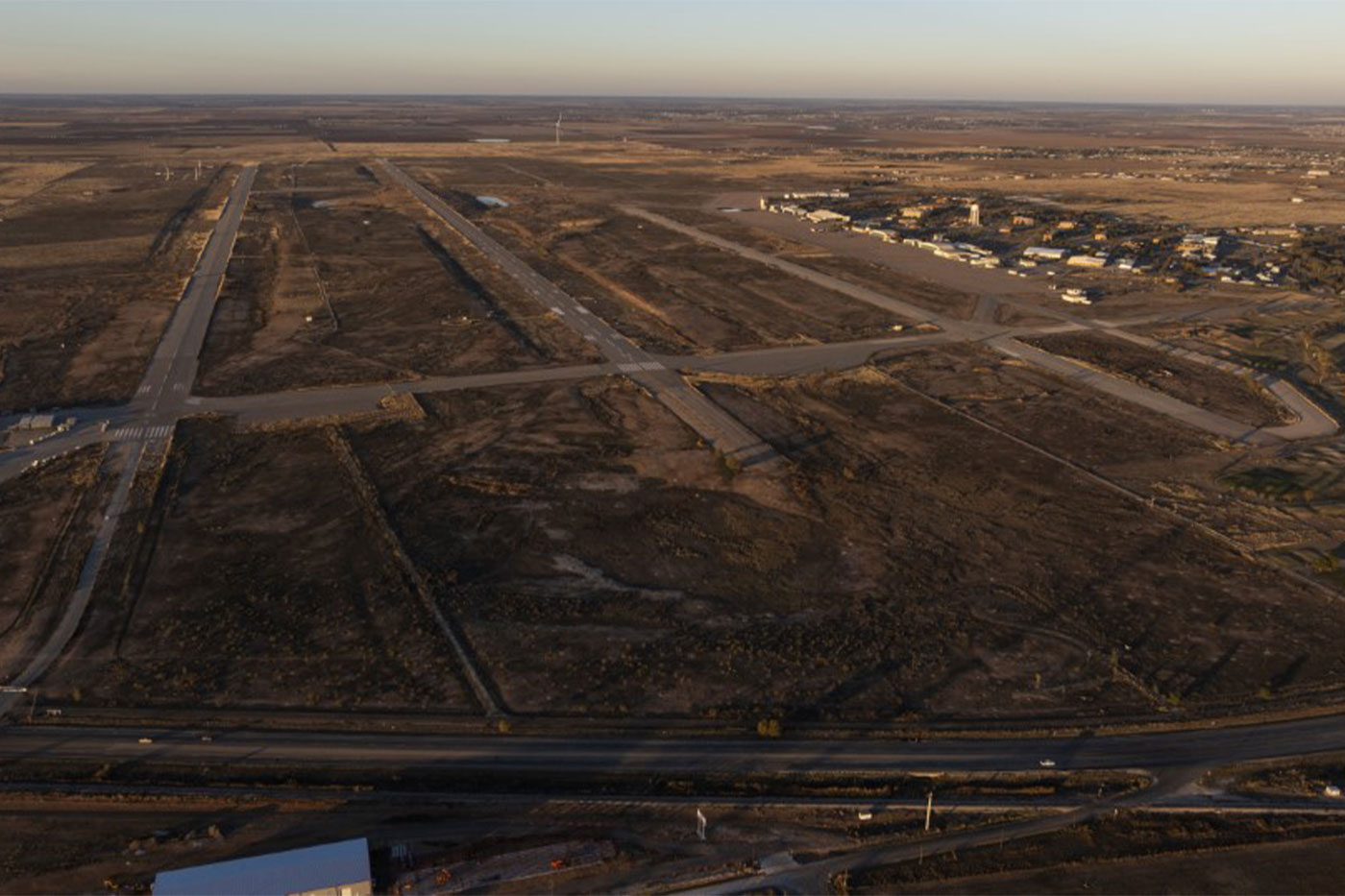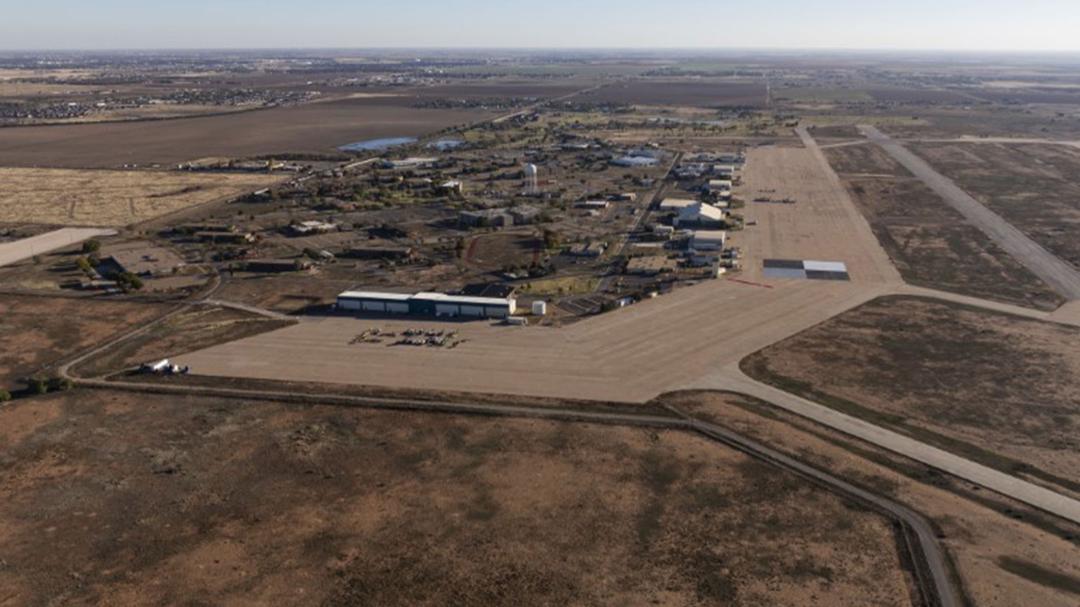Thanks to a significant investment from the state, Texas Tech is positioned to lead the way with the establishment of the Reese National Security Complex.
Texas Tech University will be a key player in the country’s high-stakes commitment to national security following a groundbreaking announcement in which the university will lead the way, developing a world-class research-focused complex at the former Reese Technology Center site west of Lubbock.
The announcement creates the Texas Tech University Reese National Security Complex (RNSC). The decision establishes a series of audacious goals signaling Texas Tech’s readiness to help drive efforts meant to ensure the safety, security and well-being of Texas and the United States.
The expansive scope of the project was made possible as the result of a significant investment by the Texas Legislature, which saw not only the potential, but also the capabilities of Texas Tech and moved to maximize the possibilities of an R1 (Tier One) Institute committed to cutting-edge research and bold innovation. The university will partner with the Lubbock Reese Redevelopment Authority (LRRA) on renovations and upgrades of existing infrastructure.
Once completed, the South Plains will be home to what arguably might be the most exhaustive national-security research-focused facility in the nation.
“This initiative represents one of the most consequential steps forward in the history of Texas Tech University,” said university President Lawrence Schovanec. “The RNSC will not only expand our research enterprise, but it will also position Texas Tech as a critical partner in addressing some of the most pressing national security challenges of our time. The support from the state affirms the confidence in our faculty, staff and students, and underscores the role Texas Tech will play in strengthening both Texas and the nation.”
New on-site facilities, including one that will enable applied defense research, are scheduled to be built over the next few years. The immediate priorities for the RNSC begin with a full assessment of current infrastructure, hiring personnel, procuring equipment and focusing on design and construction needs.
“Our goals are ambitious,” Schovanec said. “They reflect both the urgency of these national priorities and the confidence we have in our ability to deliver. Over the next several years, as new facilities are constructed and the complex becomes more fully operational, Texas Tech will create one of the premier national security research sites in the country, right here in West Texas.”
Among planned facilities, Texas Tech will create a world-class research site for Electromagnetic Pulse (EMP) testing, cyber-physical testing and pulsed-power related technologies.
Pulsed power research has taken place at Texas Tech since the 1960s. It requires storing electrical energy compressed in time and space, which is then delivered to a target in short, strong pulses of power. EMPs are brief bursts of electromagnetic energy generated by various sources that can disrupt communications or electronic equipment. In recent years, Texas Tech has emerged as a national leader in both areas.
Additionally, Texas Tech will become a national hub for testing, certification and innovation for the U.S. military through a robust partnership with federal agencies.
Likewise, the research initiatives will allow Texas Tech to meet the workforce development needs for defense research and cyber-physical critical infrastructure while enhancing its engagement with federal and industrial partners to dramatically increase federal defense research funding at the university.
The onetime U.S. Air Force base spreads over just more than 2,000 acres some 15 miles west of downtown Lubbock. Its most recent focus has been as a business and research park designed to drive economic growth through creative public-private partnerships.

The facility currently includes two private operational runways that will be upgraded as part of the RNSC’s new emphasis.
Several of Texas Tech’s most accomplished research entities such as the Institute for Environmental & Human Health and the Global Laboratory for Energy Asset Management & Manufacturing are already located at the RNSC and align with its national-security mission.
Likewise, Texas Tech’s Critical Infrastructure Security Institute (CISI) has relocated to the RNSC and continues its mission of resolving the pressing challenge of cyber-physical security threats to possible targets like transportation, health care and water systems.
The RNSC enterprise will be under the direction of Stephen Bayne, vice president for national security and executive director of the CISI. Bayne also is the former chair of the Department of Electrical & Computing Engineering in the Edward E. Whitacre Jr. College of Engineering and has an impressive track record of achievement as a leader, teacher and researcher.

“The Critical Infrastructure Security Institute is dedicated to protecting the systems our nation depends on,” Bayne said. “With the strong leadership at Texas Tech University and the transformation of Reese Technology Center to the RNSC, we have the resources and vision to develop, test and deliver solutions that keep these vital networks secure.”
The location formerly known as Reese has a long and distinguished history on the South Plains, dating to 1942, when it was established as the Lubbock Army Air Corps Advanced Flying School and soon after became the Lubbock Army Airfield. It was renamed Reese Air Force Base in 1949 in honor of Augustus F. Reese Jr., a West Texas pilot killed in action during World War II. More than 25,000 pilots were trained at Reese during its time as a military installation.
The base formally closed in 1997, and the Texas Legislature established the LRRA in 1995 to receive the base property from the federal government following official decommissioning ceremonies.
In 2025, Texas House Bill 5092 breathed new possibilities into Reese, aiming to expand its mission by incorporating the development of national security-related technology and critical infrastructure.
Further, the bill stipulated the terms to include technologies developed in partnership with Texas Tech for federal agencies, including the Department of Homeland Security. The bill was approved by the Texas Legislature and Texas Gov. Greg Abbott and became effective Sept. 1.
“Texas Tech University is helping build the future of national security,” Bayne said. “The RNSC enables us to confront the most urgent challenges facing our nation’s critical infrastructure. We are creating a center in West Texas that addresses today’s critical needs from energy and transportation to telecommunications and water, while anticipating potential threats. The work we do here will have a lasting impact while strengthening our nation’s critical infrastructure.”

